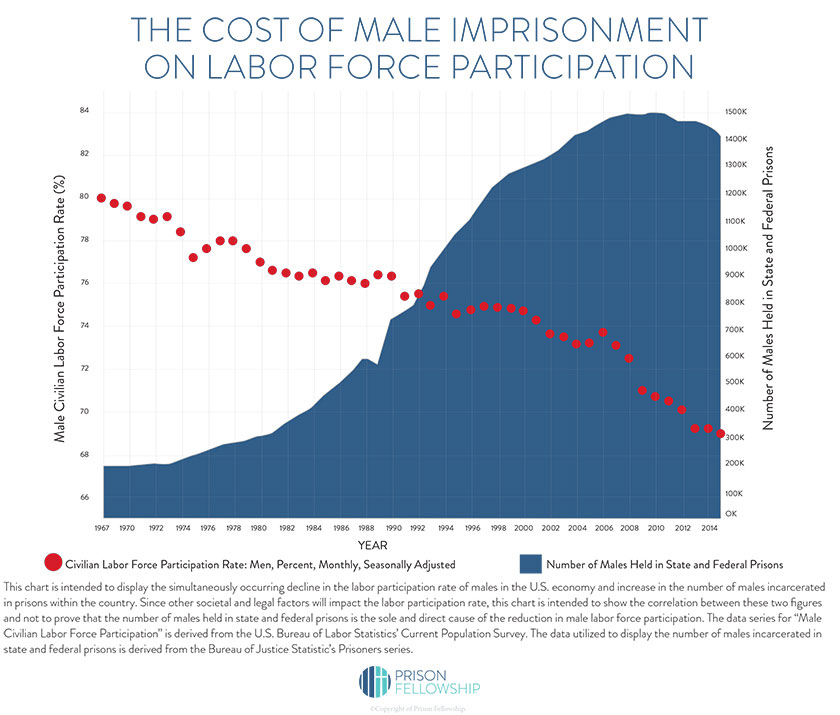America is reliant on incarceration as its main form of punishment for a majority of crimes. Since the 1960s both the number of individuals incarcerated and the length of time for which they are incarcerated has increased dramatically across our country.
THE GROWTH OF INCARCERATION
The Bureau of Justice Statistics reports that our prison population has grown by over 600 percent and the Pew Charitable Trusts has released a report showing that the sentences imposed for certain crimes have increased by as much as 320 percent.[1] While public safety was the goal of legislation that led to this growth, recent research and evidence reveals that the increased reliance on incarceration has led to higher levels of recidivism, decreased public safety, and increased cost to taxpayers.
THE IMPACT OF INCARCERATION ON THE FUTURE FINANCIAL SUCCESS OF THE INDIVIDUAL
Throughout Second Chance Month we at Prison Fellowship® discussed the impact that incarceration and collateral consequences have on the future success of individuals who are returning to their community from prison. Even though research has clearly revealed that gaining meaningful employment is one of the most significant predictors of success for returning neighbors, over 90 percent of those who have been incarcerated struggle to find employment within their first year after release.[2]
This is likely the result of the more than 48,000 legal barriers barring 65 million Americans from working in certain occupations and the societal pressure that employers feel to not hire returning neighbors.[3] Ultimately, this struggle results in a 15 percent reduction in post-release income for families with a father who has been incarcerated. It also has a large negative impact on the economic mobility of both the individual who was incarcerated and his or her children.[4]
HOW INCARCERATION HAS IMPACTED THE AMERICAN ECONOMY
While the impacts of incarceration on the future of an individual are clearly known, there is limited analysis about how incarceration impacts the economy. The graph above provides innovative analysis of data released by various federal agencies on labor force participation and male imprisonment.[5]
There is a clear correlation between the more than 10 percent decrease in the number of males who are involved in our labor force and the almost 600percent growth in the number of males who are imprisoned in our country. This reveals that the effects of incarceration on an individual’s future economic opportunity have at least some aggregate impact on our economy as a whole.
HOW WE CAN SOLVE THIS PROBLEM
At Prison Fellowship, we seek a justice system that prioritizes proportional punishment and allows individuals who have paid their debt to society to have closure. Many crimes today do not receive a punishment that matches the level of harm caused.
As Americans, we should seek proportional alternatives to incarceration for crimes where such alternatives are just and more effective than incarceration alone. We must also seek to remove the outrageous collateral consequences in existence today that prevent returning neighbors from securing meaningful employment and becoming productive members of their community. In addition, we must seek to equip ourselves to interact with those with a criminal record and encourage their efforts to become contributing members of their family and community.
By adopting fair hiring practices in our businesses and organizations, we can open opportunities for returning neighbors and access a work force that is highly dedicated and hard working.
In an era where concern for the growing cost of social welfare programs as well as our growing economic inequality, this is one issue that both sides of the political spectrum can work together. By ensuring that Americans with a criminal record have an equal opportunity to securing meaningful employment, we can regain the economic productivity that has been lost over the past 50 years from over-utilization of incarceration as a solution to crime.
FAITH & JUSTICE FELLOWSHIP LEGISLATIVE PLAYBOOK 201-2018
This report is designed to assist policymakers and staff as they support justice reform that transforms those responsible for crime, validates victims, and encourages communities to play a role in creating a safe, redemptive, and just society.
FAITH & JUSTICE FELLOWSHIP LEGISLATIVE PLAYBOOK
TESTIMONY OF HEATHER RICE-MINUS BEFORE THE UNITED STATES SENTENCING COMMISSION
Presented on March 14, 2018, by Heather Rice-Minus, vice president of government affairs at Prison Fellowship. This testimony was given before the United States Sentencing Commission during a public hearing on proposed amendments to the sentencing guidelines for first offenders and alternatives to incarceration.
[1] See Bureau of Justice Statistics, Prisoners Series, U.S. Department of Justice (2016), available at https://www.bjs.gov/index.cfm?ty=pbse&sid=40; The Pew Center on the States, Time Served: The High Cost, Low Return of Longer Prison Terms, The Pew Charitable Trusts (June 2012), https://www.pewtrusts.org/~/media/assets/2012/06/6/time_served_report.pdf.
[2] John M. Nally, et al., Post-Release Recidivism and Employment among Different Types of Released Offenders: A 5-Year Follow-up Study in the United States, 9 Int’l J. of Crim. Just. Sci. 1, 16, 23 (2014); Le’Ann Duran, et al., Integrated Reentry and Employment Strategies: Reducing Recidivism and Promoting Job Readiness, The Council of State Governments Justice Center (2013), https://csgjusticecenter.org/wp-content/uploads/2013/09/Final.Reentry-and-Employment.pp_.pdf.
[3] Harry J. Holzer, Collateral Costs: The Effects of Incarceration on the Employment and Earnings of Young Workers 12 (Institute for the Study of Labor, Discussion Paper No. 3118, October 2007); Justice Center, National Inventory of Collateral Consequences, The Council of State Governments (2016), https://niccc.csgjusticecenter.org/map/; Michelle Natividad Rodriguez & Maurice Emsellem, 65 Million “Need Not Apply:” The Case for Reforming Criminal Background Checks for Employment, The National Employment Law Project (March 2011), https://www.nelp.org/content/uploads/2015/03/65_Million_Need_Not_Apply.pdf.
[4] Rucker C. Johnson, Ever-Increasing Levels of Parental Incarceration and the Consequences for Children, in DO PRISONS MAKE US SAFER? THE BENEFITS AND COST OF THE PRISON BOOM 177-206 (Steven Raphael & Michael Stoll eds., 2009) The Pew Center on the State, supra note 1.
[5] See U.S. Bureau of Labor Statistics, Current Population Survey, United States Department of Labor (2017), available at https://www.bls.gov/cps/; Bureau of Justice Statistics, supra note 1.
